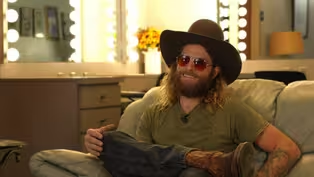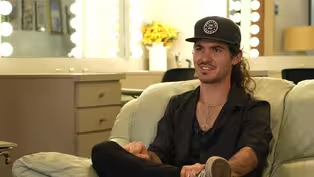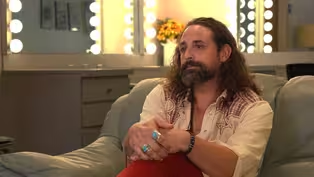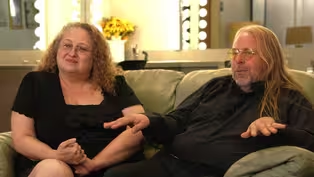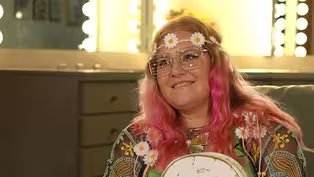
Offstage - Justin Jeansonne
Clip: Season 15 | 8m 23sVideo has Closed Captions
Justin Jeansonne talks traditional country music and the inspiration for his genre-defining sound.
Justin Jeansonne talks traditional country music and the inspiration for his genre-defining sound.
Problems playing video? | Closed Captioning Feedback
Problems playing video? | Closed Captioning Feedback
StudioAmped is a local public television program presented by WSRE PBS
This program is sponsored in part by Jacque Falzone, The Bear Family Foundation, Innisfree Hotels, and Blue Angels Music,.

Offstage - Justin Jeansonne
Clip: Season 15 | 8m 23sVideo has Closed Captions
Justin Jeansonne talks traditional country music and the inspiration for his genre-defining sound.
Problems playing video? | Closed Captioning Feedback
How to Watch StudioAmped
StudioAmped is available to stream on pbs.org and the free PBS App, available on iPhone, Apple TV, Android TV, Android smartphones, Amazon Fire TV, Amazon Fire Tablet, Roku, Samsung Smart TV, and Vizio.
Providing Support for PBS.org
Learn Moreabout PBS online sponsorshipWell, I just wanna sit on the porch and smoke my brain.
Make the living writing songs I sing.
It's, you know, it's a traditional country throwback with, some modern influences in it.
I grew up listening to a lot of Willie Nelson and, you know, I get that one a lot, but, you know, it's mostly my own thing.
And I write what I write.
Some songs sound the same, and some are vastly different.
We've kind of comprised some of those tonight.
You know, we, have, an album that I'm working on right now, but the next one is going to probably be vastly different than this one.
So it's a little, you know, off the wall, but it's yeah, it's traditional country.
When I was probably in sixth grade, I started, playing violin and, the middle school strings program, and I had always my, my uncle was a singer, and, he turned down a development deal from Sony in 2001, still lives in the Nashville area, but after that, he really kind of quit.
And, I grew up watching him a lot.
So I think that had a lot to do with it.
And, I don't know, there's kind of like a gene.
You get that you can't turn off.
My dad didn't really listen to much country.
My dad was a rock and roll guy.
But my grandfather, he loved country music.
And, Willie Nelson was one of his favorites.
And both of my grandparents favorites.
And, I kind of found Merle Haggard on my own when I started playing.
And, you know, I probably had 20 or 30 Merle Haggard tunes that I had learned to display from my, you know, covered cover gigs and stuff like that.
So, yeah, it definitely influenced a lot of my writing.
You know, early on in the Merle Haggard Willie, the Waylon, Johnny Cash stuff like that, you know, real classic country.
Dayton and Mason, have been with me for a long time.
On and off for different periods.
And, the, the drummer and the lead guitar player, the newest members and, the last year, probably we've been working together and guitar player even more recently, like six months.
But, I know they want to work together and they want it to sound right, and they are concerned about, you know, how I feel about what they're doing.
So it's it's an even healthy mix of personalities.
sometimes as a melody, sometimes as a thought about an idea of like, man, people need to know about this or people, you know, people need to hear about this and might drive me to write some lyrics first or whatever, you know, or just like, like I said, it's melody just in my head all day.
And I keep humming it, hearing it.
And then I'll, I got to put that as something.
So it's, it kind of comes in all forms, but it's just like, something that's always happening, you know, whether it's like a wake up and write an idea down or, you know, hear Melody when I'm going to sleep at night.
And I remember at the next day in life, you're going to experience things that are going to shape you.
And you can either when tragedy happens, you can either die with it, or you can use it as fuel to your fire to drive forward on a mission.
So I've had already kind of done that musically and not realized it.
And then I had some things happen in my life where that's what I turned it into.
I was like, I'm either going to be here doing drugs, laying in the ditch, whatever, you know, the bottom of the barrel, or I'm going to take this and make something of it and use it for good.
And that's kind of what I've done, you know, throughout my career progressively.
And I, and I hope to do that for other people to, you know, take their experiences and do the same thing.
The early days, it wasn't what it is now.
Now it's, you know, there's so much more to it than pieces.
Just put a video out there before and people, you know might see it or they might not.
But now with social media, there's so many other marketing platforms where you can drag them back to YouTube or whatever.
But, even early on, social media was always and in my career was important, you know, Myspace was there and then Facebook came along and, we were doing this thing with 95 KSA where we were putting a video out on social media, and then we submit it to them.
And I got picked up and they had this thing called under the covers, I believe, or whatever.
It was like cover songs.
But so, I mean, even early on, social media was always helping me, come up and, and and some of it is it can be Henderson too, you know, you know, stories and knowledge that we can pass along through, through songs that people remember them easier.
They help people just from just a lyric or even just the way a melody makes someone feel.
I think that the future that we're going to experience is going to be heavily shaped by the music that people are listening to.
And, I think if you have the ability to say something that's powerful, you should get out there and do it.
You know, the world needs more people like that.
I'm meant to be in nature.
And, some like my harmonica player and we do kayak and trips and we do all kinds of stuff while we're on the road, you know, while or two, and we'll go hit waterfalls and stuff.
So when I come home, which we tour a lot of the year, we've done about 60,000 miles this year.
And when I come home, I like to get away from all of them and get out there and work with, creature that I don't have to talk to.
You know, my horses listen through body language and and feel and and my energy.
They don't need me to tell them what to do, you know, so to speak.
And I'm tired of that.
But, I get home.
So I joined at a high school, and, my grandpa, my grandfather, was a marine in Korea, and I always knew I wanted to do it.
And now I'm glad I did, but I wouldn't recommend it, you know, to.
No, I mean, it's true, and you got to find out, but, it definitely shaped who I am, who I am as a leader, who I'm able to be for these guys when you know they're tired and they're hurting and they're going internal and they can't even think about three feet in front of them.
I've been there, you know?
So I think it's helped me be the leader, for this, this, you know, career that I've chosen.
But, definitely was happy to be done with it when I was done.
Actually went back.
I joined the Army.
I lived in Nashville for a year and a half, and, got stuck in rent, and I wanted to get out of there.
So I joined the Army and I moved out to Fort Bliss in, El Paso, Texas.
And I was there for three years, too.
I came back to mobile and put the band back together.
We are going to put out an album before the end of the year.
I know that sounds pressing, but it's going to be something small.
Nothing huge, but, it's just been a crazy year, so we haven't had a lot of time to get in the studio.
We've been working, working and working and working and driving around, driving around.
So, hey, getting out there and seeing the people is more important.
And sometimes, you know, if you ask my wife, she would tell me or she would tell you that, it's just something in our blood, you know, it happens, we hear it.
And that's kind of where the Cowboys of the road song came from.
I can't really turn it off.
You know, sometimes you just want to get one off, you know, get on stage in front of some people and play some music.
It makes you feel a specific way, whether it's like an adrenaline rush.
But also, for me is a mission.
You know, it's the mission to help and to heal.
I had a friend, and that's when I had a friend calling me last night.
He's up there in North Carolina helping with the disaster zone, and he's just like, I don't know who to call me.
And he's like, well, we pulled out eight bodies today.
You know, he's like, I don't even know how to process this.
And he's like, you need to tell somebody about what this is going on.
And, you know, to that effect that that's kind of my job is to take people's tragedy and story and tell their story and share it with the world so that they get help healing, you know, and so that doesn't happen again.
I am a force to be reckoned with.
Don't stand in my way.
That's about it.
I love and light and kind, but don't get in my way.
I'm on a mission, man on mission.
My baby.
Will.
Video has Closed Captions
Clip: S15 | 8m 23s | Justin Jeansonne talks traditional country music and the inspiration for his genre-defining sound. (8m 23s)
Video has Closed Captions
Clip: S15 | 6m 49s | R&B artist Jordan Chase talks about his passion for music, and his appearance on NBC's "The Voice." (6m 49s)
Offstage - Johnny Hayes & The Alabama Fire
Video has Closed Captions
Clip: S15 | 8m 12s | Johnny Hayes talks about musical inspiration and his appearance as a finalist on NBC's "The Voice." (8m 12s)
Video has Closed Captions
Clip: S15 | 6m 10s | Theresa and Glenn Vignolo talk about the revival of Civilized Natives and their new sound. (6m 10s)
Video has Closed Captions
Clip: S15 | 5m 23s | Bangarang Peter's lead vocalist, Renee Amelia, talks songwriting, musical genre, and inspiration. (5m 23s)
Providing Support for PBS.org
Learn Moreabout PBS online sponsorship

- Arts and Music
The Best of the Joy of Painting with Bob Ross
A pop icon, Bob Ross offers soothing words of wisdom as he paints captivating landscapes.












Support for PBS provided by:




